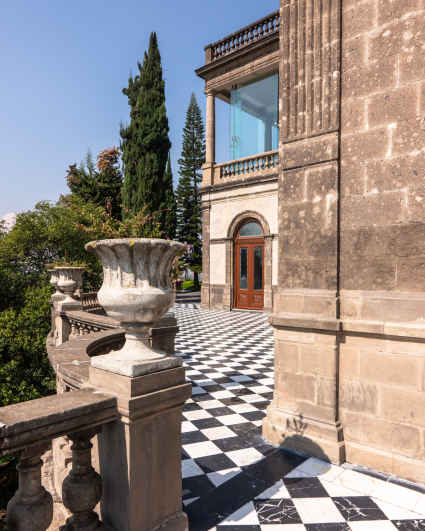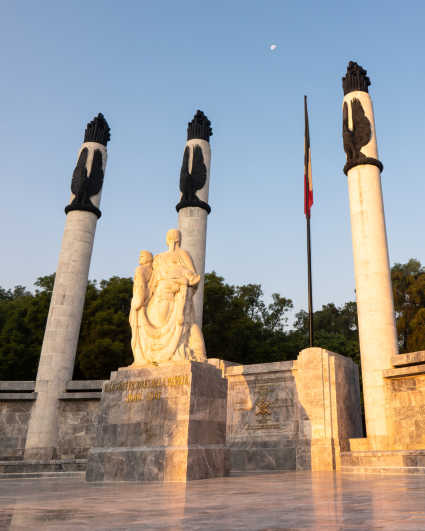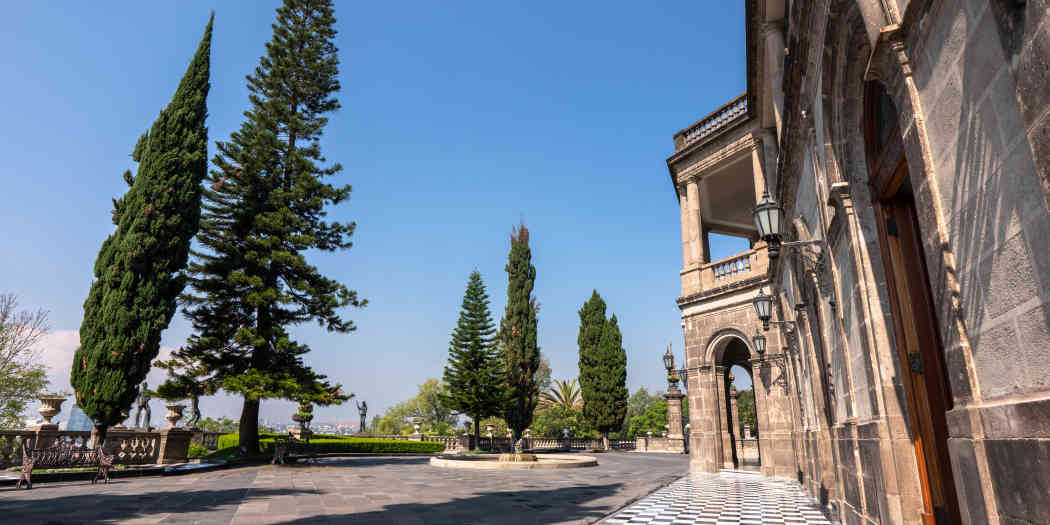Highlights
A Royal Residence
Set on a hilltop with sweeping views of the Valley of Mexico, this grand and palatial building has seen Mexico’s history unfold within its walls.
Chapultepec Castle first housed Mexico’s leader in the colonial period, when the Viceroyalty of New Spain used the building as a summer house. But it was not until the French intervention in Mexico in the 1860s that Mexico’s ruler, Emperor Maximilian von Hapsburg, transformed the castle into his grand imperial residence.
Maximilian hired a team of architects to renovate the castle. Filling it with works of art shipped from Europe, he reconstructed the castle in the style of a European royal palace.
Maximilian’s reign did not last long. In 1867, his empire was defeated by republican forces, the emperor was captured and executed, and Chapultepec Castle was left abandoned.
But the presidents of the newly restored Mexican republic would soon claim the castle as their official residence. It remained so until 1939, when the president moved to Los Pinos, a nearby building in Chapultepec Park.
The castle was then converted into the National Museum of History. The building has been open to the public ever since, filled with thousands of artifacts and epic murals that offer a fascinating retelling of Mexico’s past.

The Battle of Chapultepec
Chapultepec Castle was the site of one of the most consequential events in Mexico’s history.
In 1846, a territorial dispute over Texas’s southern border erupted into full-scale war between the United States and Mexico.
Invading U.S. troops reached as far south as Mexico City, capturing Chapultepec Castle on September 13, 1847.
At the time, the castle was being used as a military academy. Here, six young cadets died defending the castle. One reportedly leapt to his death wrapped in the Mexican flag to prevent it being captured by the invading forces.
The six fallen cadets, known as the Niños Héroes, are commemorated in Mexico to this day.
In Chapultepec Castle, a spectacular mural painted by Gabriel Flores adorns the ceiling above the staircase in the main entrance. This epic artwork depicts one of the Niños Héroes falling to his death wrapped in the Mexican flag, below Chapultepec Castle and an eagle, a symbol of the Mexican nation. And at the foot of the hill below the castle stands the imposing ‘Monumento a los Niños Héroes’, with six pillars commemorating each of the fallen children.
The signing of the Treaty of Guadalupe Hidalgo in 1848 ended the U.S. occupation of Mexico, but resulted in around 40% of Mexico’s landmass, including the present-day states of Texas, New Mexico and California, being ceded to the United States.

Tickets & Opening Hours
| Monday: | Closed | ||
|---|---|---|---|
| Tuesday to Sunday: | 09:00 AM | — |
05:00 PM |
| Tickets (Mexican Pesos): | $ 95 |
|---|---|
| Approx. cost in US dollars: | $ 5.00 |
Tickets are readily available to buy in-person before visiting the castle. The ticket office is located inside Chapultepec Park at the foot of the hill below Chapultepec Castle.
Tickets can be purchased online from:
Instituto Nacional de Antropología e Historia (INAH)
Select either ‘Nacional History Museum’ or ‘Museo Nacional de Historia’, depending on whether you have set the website language to English or Spanish. This is the name of the museum located within Chapultepec Castle. Select the date of your visit and follow the on-screen instructions to purchase.
Getting There
Chapultepec Castle is located in the center of the eastern section of Chapultepec Park.
Regardless of whether you arrive by car, public transport or on foot, there is around a 20-minute walk from the Chapultepec Park gates to the castle entrance. The path to the castle is up a steep hill.
The park gates are surrounded by some very pleasant and walkable districts, but if you are planning to walk to Chapultepec Park and then up the hill to Chapultepec Castle, be prepared to cover some distance.
This section of Chapultepec Park is within easy walking distance of some prestigious museums that border the park, notably the National Museum of Anthropology. It is also close to the hotels and monuments of Avenida Paseo de la Reforma, including the Angel of Independence.
Chapultepec Park can be safely reached on bicycle. There is a dedicated bike lane separated from the traffic that runs along Avenida Paseo de la Reforma.
Heading east, this bike lane connects the park to the Roma and Condesa neighborhoods, or head north-west towards Polanco.
Every Sunday morning, Avenida Paseo de la Reforma is closed to traffic, which makes this the perfect time to explore Chapultepec Park and the surrounding districts on bicycle.
Bikes can be hired by the minute using the Ecobici app, with hundreds of stations located on almost every major street corner in this region of Mexico City. Download the app, find an Ecobici station, and unlock any bike by scanning the QR code printed on each bike.
Rideshare apps Uber and Didi are widely used across Mexico City.
Select either of the following destinations, which both take you to the same place:
-
Bosque de Chapultepec, Av Reforma S/N, Col Observatorio, 11860 Miguel Hidalgo, Ciudad de México
-
Castillo de Chapultepec, Miguel Hidalgo, 11100, Ciudad de México
Keep in mind that the driver can only drop you at the park gates. From there, you will need to walk through the park following signs to Chapultepec Castle (‘Castillo de Chapultepec’). There is a 5 - 10 minute walk to the ticket office at the bottom of the hill, followed by around a 15-minute walk uphill to the castle entrance.
The center of Mexico City is clogged with traffic and difficult for visitors to navigate when driving. But for those choosing to self-drive, there are several parking lots close to Chapultepec Park.
The best options are:
Turibus is a convenient way to tour all of Mexico City’s major sights in a short time. Open-top buses offer great views of the city, while the driver takes care of navigating the chaotic streets.
The Turibus Centro Historico route runs down Avenida Paseo de la Reforma, where is passes Chapultepec Park. Two stops offer easy access to Chapultepec Castle:
- Modern Art Museum / Tamayo Museum
- Anthropology Museum
This circuit covers many of the city’s other major points of interest, including:
- The Zócalo & Metropolitan Cathedral
- Palacio de Bellas Artes
- The Angel of Independence & Avenida Paseo de la Reforma
- Monument to the Revolution
Full details of the route and pick-up points are available from Turibus.
Tickets can be purchased in-person at the bus stops, or prebook online from Turibus, Viator or Get Your Guide
Chapultepec Castle is easily accessed along Line 7 of the Metrobus network, which runs along Avenida Paseo de la Reforma.
The nearest station is Gandhi. The stations Antropología and Chapultepec are also conveniently located close to the park gates.
To the east, this line heads past the hotels and monuments of Avenida Paseo de la Reforma, which is a short walk from the Roma and Condesa neighborhoods. It continues towards the station Hidalgo, which is a short walk from the sights of the Centro Histórico.
To the west, the route continues for a short distance to Auditorio and Campo Marte, which are conveniently located near the heart of Polanco.
The nearest Metro stations are:
- Auditorio on Line 7, which is one stop away from the center of Polanco
- Chapultepec, however, this is currently closed for major renovations

